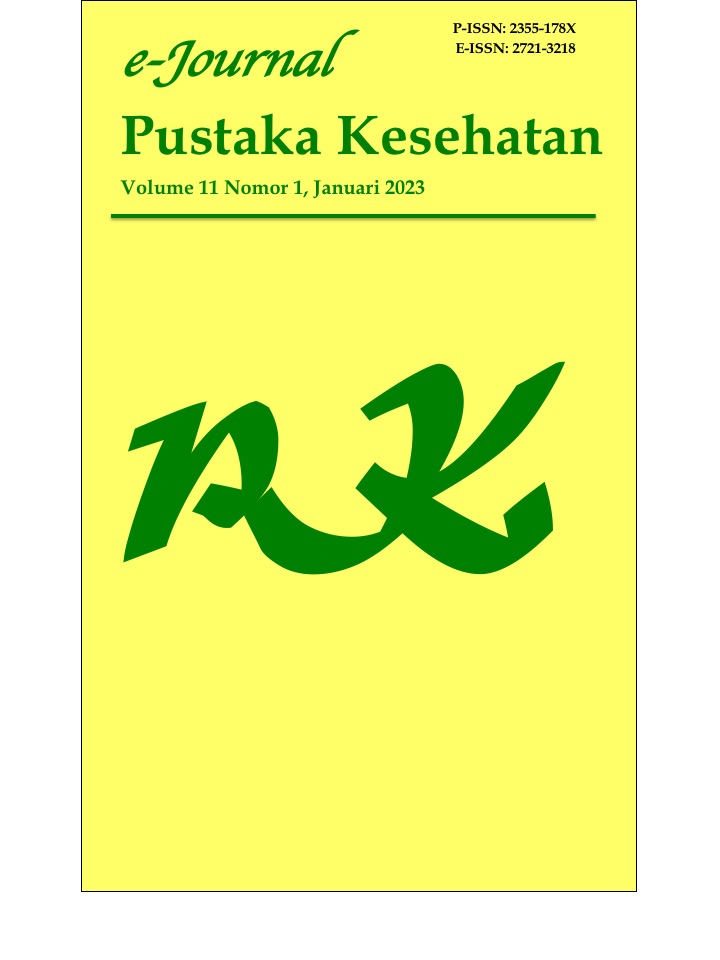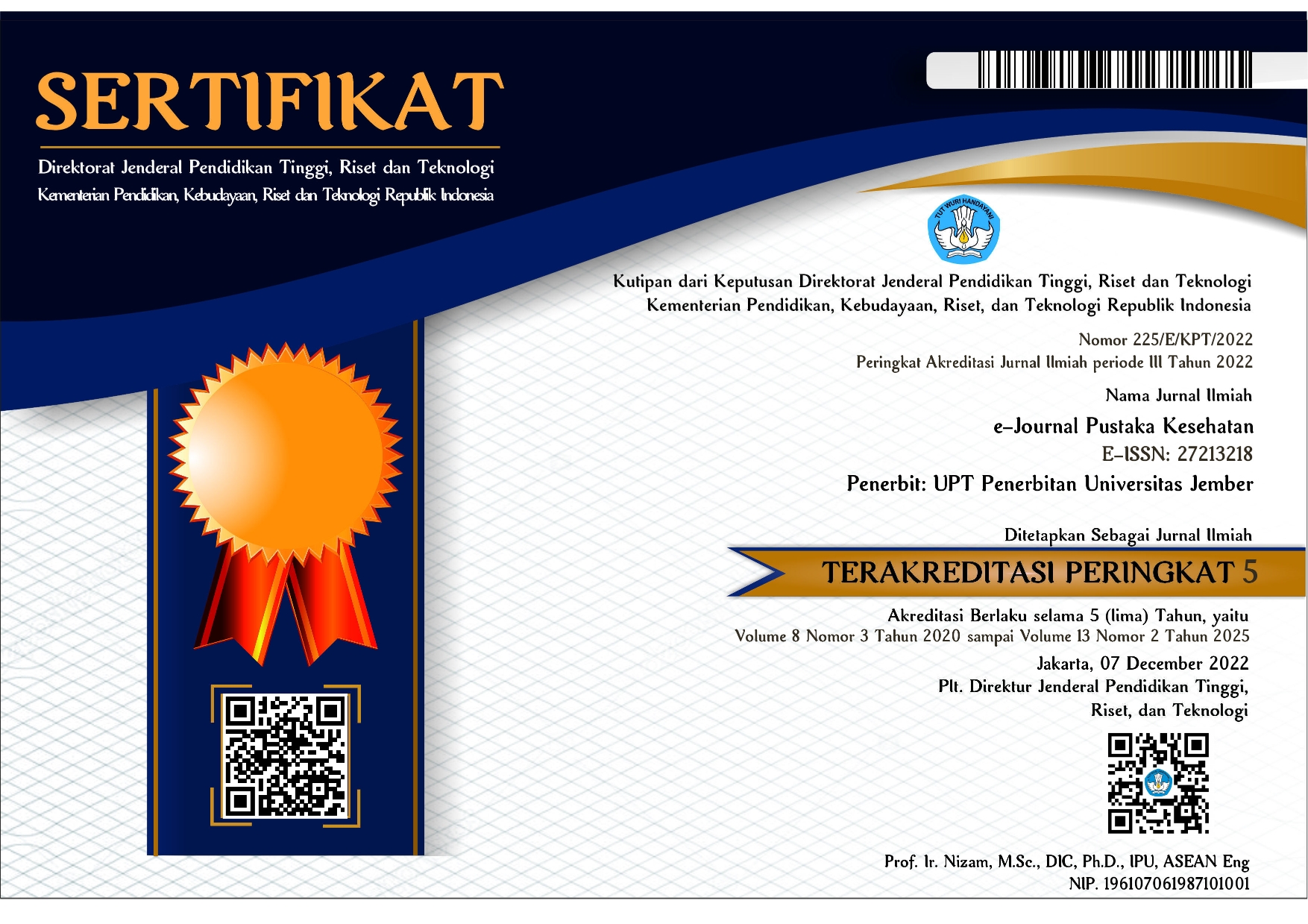Keterkaitan Karakteristik Demografi dengan Depresi pada Keluarga Pasien Stroke di RSUD Dr. Haryoto-Lumajang
DOI:
https://doi.org/10.19184/pk.v11i1.12973Keywords:
demographic characteristic; depression, strokeAbstract
Stroke could cause disability and death for sufferers. Stroke patients with family assistance have to maintain daily activities. Family of stroke patients who gives long-term care have experience problems especially depression. The purpose of this study was to analyze the relationship between demographic characteristics and depression of family with stroke patient using cross sectional aprroach. The sampling technique was consecutive sampling with a total sample of 65 respondents determined using G*Power. The measuring instruments used demographic characteristic questionnaire and Beck Depression Inventory II (BDI II). This study found the prevalence of depression in families of stroke patients were 24 (36.9%) depressed and 41 (63.1%) not depressed. Moreover, there were no relation between characteristics (gender, age, education status, employment status, relationship with patients, stroke attack, duration of care) and depression in family with stroke patients (p>0.05). Depression could occur because of internal and external factors in a person depending on each person’s problem solving ability. Further research, should be conducted to examine the intervention of nursing that are appropriate for preventing the occurrence of depression in family of stroke patients.
Downloads
References
[2] Valery LF, Bo N, and George AM. Global Burden of Stroke. Circ. Research. 2017: 120(3): 439–448.
[3] American Heart Association. Heart Disease and Stroke Statistics 2018 Update: A Report from the American Heart Association. Circulation.2018: 137(14): e67–e492.
[4] Kementerian Kesehatan Republik Indonesia. Potret Sehat Indonesia dari Riskesdas 2018. Jakarta: 2018.
[5] Ifeanyi UC, Sa’ad FS, Martin OC, Monday MS, and Onyinyechukwu NJ. Prevalence of Depression Among Primary Caregivers of Stroke Survivors in Nigeria. Middle East J. Rehabil. Health. 2018: 5(2): 1-6
[6] Rosyidah A. Pengalaman Pendampingan Keluarga Dalam Merawat Anggota Keluarganya Pada Kondisi Vegetative Dalam Konteks Asuhan Keperawatan Di RSUP. Fatmawati Jakarta. Tesis. Jakarta: Program Pasca Sarjana Fakultas Ilmu Keperawatan Universitas Indonesia; 2010.
[7] Endang P. Gambaran Stres Keluarga yang Merawat Pasien Stroke Pasca Perawatan di RSU PKU Muhammadiyah Bantul. Naskah Publikasi. Yogyakarta: Sekolah Tinggi Ilmu Kesehatan Aisyiyah; 2012.
[8] Maslim R. Diagnosis Gangguan Jiwa, Rujukan Ringkas PPDGJ-III dan DSM-5. Jakarta: Bagian Ilmu Kedokteran Jiwa FK-Unika Atmajaya; 2013.
[9] Sheila. L. Videbeck, Buku Ajar Keperawatan Jiwa. 1st ed. Jakarta: EGC; 2008.
[10] Yuan LG and Yan JL. Family functioning and depression in primary caregivers of stroke patients in China. Int. J. Nurs. Sci., 2015: 2(2): 184–189.
[11] Radu V. Saveanu and Charles B. Nemeroff, Etiology of Depression: Genetic and Environmental Factors. Psychiatr. Clin. North Am., 2012: 35(1): 51–71.
[12] Guler DA and Sevgisun K. Burden of Caregivers of Stroke Patients. Turkish J. Neurol., 2013: 19(1): 5–10.
[13] Danesh NA and Landeen J. Relation between depression and sociodemographic factors. Int. J. Ment. Health Syst., 2007: 1(4): 1–9.
[14] Sutinah and Maulani. Hubungan Pendidikan, Jenis Kelamin, dan Status Perkawinan dengan Depresi Pada Lansia. J. Endurance. 2017: 2(2): 209–216.
[15] Willeke J. Kruithof MW. Post M, Van Mierlo ML, Geertrudis AM, van den Bos JM. de M. Ginkel, and Meily JMAV. Caregiver burden and emotional problems in partners of stroke patients at two months and one year post-stroke: Determinants and prediction. Patient Educ. Couns., 2016: 99(10): 1632–1640.
[16] Luca M, Bellia S, Bellia M, Luca A, and Calandra C. Prevalence of depression and its relationship with work characteristics in a sample of public workers. Neuropschy. dis. and treatment. 2014: 10: 519–525.
[17] Deyva D. Hubungan Kualitas Hidup, Depresi, dan Beban Keluarga sebagai Caregiver dengan Serangan pada Pasien Stroke di Poliklinik Rumah Sakit Stroke Nasional Bukittinggi 2017. Skripsi. Sumatera Barat: Fakultas Keperawatan Universitas Andalas; 2017.
[18] Gbiri CA, Olawale OA, and Isac SO. Stroke management : Informal caregivers ’ burdens and strians of caring for stroke survivors. Ann. Phys. Rehabil. Med., 2015: 58(2): 98–103.
[19] Ginting H, Eysenck MW, Näring G, Van Der Veld WM, and Srisayekti W, “Validating the Beck Depression Inventory-II in Indonesia ’ s general population and coronary heart disease patients,†Int. J. Clin. Heal. Psychol.,2013: 13(3):235–242.
[19] Rohmatin YK, Limantara S, and Arifin S. Gambaran Kecenderungan Depresi Keluarga Pasien Skizofrenia Berdasarkan Karakteristik Demografi dan Psikososial. Berk. Kedokt., 2016: 12(2): 239–253.
[20] A’la MZ and Efendi D. Kesejahteraan Spiritual Keluarga Pasien Stroke dan Kaitannya dengan Depresi. J. Ners Midwifery Indones., 2015: 3(3): 129–133.
[21] Bemister TB, Brooks BL, Dyck RH, and Kirton A. Predictors of caregiver depression and family functioning after perinatal stroke. BMC Pediatr., 2015: 15, (1): 1–11.
[22] GriesCJ, Engelberg R, Kross EK, and Curtis JR. Predictors of Symptoms of Posttraumatic Stress and Depression in Family Members After Patient Death in the ICU Predictors of Symptoms of Posttraumatic Stress and Depression in Family Members After Patient Death in the ICU. Chest. 2010: 137(2): 280–287.
[23] Kusumawardhani A. Depresi Perimenopause. Jakarta: Balai Penerbit Fakultas Kedokteran-Universitas Indonesia; 2006.
[24] Loh AZ, Tan JS, Zhang MW, and Ho RC. The Global Prevalence of Anxiety and Depressive Symptoms Among Caregivers of Stroke Survivors. J. Am. Med. Dir. Assoc., 2017: 18(2): 111–116.
[25] Pradita DA and Rochmawati I. Hubungan Antara Faktor Demografi dengan Depresi pada Penderita Riwayat Stroke di Kabupaten Gunung Kidul DIY. Skripsi: Yogyakarta: Universitas Muhammadiyah Yogyakarta; 2017.
[26] Nuraenah, Mustikasari, and Putri YSE. Hubungan Dukungan Keluarga dan Beban Keluarga Dalam Merawat Anggota Dengan Riwayat Perilaku Kekerasan di RS. Jiwa Islam Klender Jakarta Timur 2012. J. Keperawatan Jiwa. 2012: 2(1): 41–50.
[27] Astiti A. Analisis Faktor-Faktor yang Berhubungan dengan Depresi pada Pasien Gagal Ginjal Kronik yang Menjalani Hemodialisis di RSUD Panembahan Senopati Bantul. Skripsi: Yogyakarta: Universitas Muhammadiyah Yogyakarta; 2014.
[28] Sugimin. Kecemasan Keluarga Pasien di Ruang Intensive Care Unit Rumah Sakit Umum Pusat Dokter Soeradji Tirtonegoro Klaten. Tesis. Surakarta: Fakultas Ilmu Kesehatan Universitas Muhammadiyah Surakarta; 2017.
[29] Malhotra R et al. Short-Term Trajectories of Depressive Symptoms in Stroke Survivors and Their Family Caregivers. J. Stroke Cerebrovasc. Dis. 2015: 25(1): 172-181.
[30] Kose I, et al. Factors Affecting Anxiety and Depression Symptoms in Relatives of Intensive Care Unit Patients. J. Intensive Care Med., 2015: 31(9): 611–617.
[31] Friedman MM. Buku Ajar Keperawatan Keluarga: Riset, Teori, & Praktik, 5th ed. Jakarta: EGC, 2010.
[32] Suardana IW, “Hubungan Faktor Sosiodemografi, Dukungan Sosial Dan Status Kesehatan Dengan Tingkat Depresi Pada Agregat Lanjut Usia di Kecamatan Karangasem, Kabupaten Karangasem Bali. Skripsi. Depok: Fakultas Ilmu Kesehatan Universitas Indonesia ; 2011.
[33] Handayani DY. Analisis Kualitas Hidup Penderita dan Keluarga Pasca Serangan Stroke (dengan gejala sisa). Psycho Idea. 2009: 7(1): 35–44.
[34] Vika WN, Syarifah AS, and Ratnawati M. Hubungan Status Fungsional Dengan Tingkat Ddepresi Pada Pasien Stroke di Ruang Flamboyan RSUD Jombang. Jurnal Ilmiah Kebidanan. 2017: 4(1): 52–59.
[35] Gbiri CA, Olawale OA, and Isaac SO. Stroke management: Informal caregivers’ burdens and strians of caring for stroke survivors. Ann. Phys. Rehabil. Med., 2015: 58(2):98–103.
[36] Nurjannah S dan Setyopranoto. Determinan beban pengasuh pasien stroke pasca perawatan di rumah sakit di RSUD dr . Soediran. BKM J. Community Med. Public Heal., 2018: 34(3): 143–148.
Downloads
Published
Issue
Section
License
e-Journal Pustaka Kesehatan has CC-BY-SA or an equivalent license as the optimal license for the publication, distribution, use, and reuse of scholarly work. Authors who publish with this journal retain copyright and grant the journal right of first publication with the work simultaneously licensed under a Creative Commons Attribution-ShareAlike 4.0 International License that allows others to share the work with an acknowledgment of the work's authorship and initial publication in this journal.







